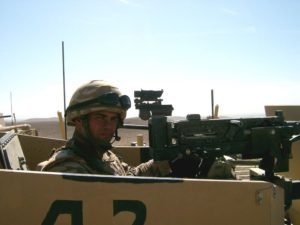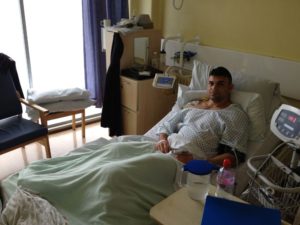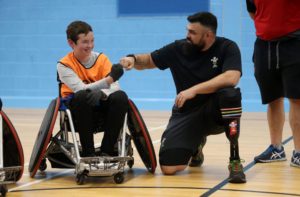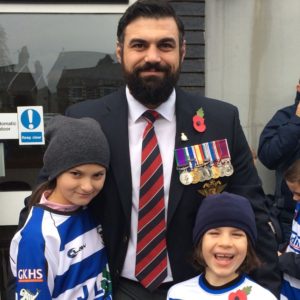Darren served in the Army for over 17 years and was wounded by an IED in Afghanistan. After years of operations, his left leg was amputated below the knee. Our charity funded a Personal Trainer course, which helped him to become a rugby coach, and garden adaptations to enable better wheelchair access.
Darren first joined the Royal Regiment of Wales before transferring in 2005 to 1st Queen’s Dragoon Guards, and he served in Germany, N Ireland, Kosovo, Iraq twice and Afghanistan. In 2008, his life changed forever whilst on patrol in Afghanistan. His Mastiff armoured vehicle was hit by an IED in Helmand, and he sustained serious damage to his left foot and ankle: “When the floor plates of my vehicle burst, the bolts went up to the ceiling while one of the washers the size of a 50p piece went through the heel of my boot and shattered my foot.”

After four years of operations, medication and constant pain, Darren decided to have an amputation below the left knee. He recalls: “I couldn’t engage with the outside world and was a slave to my medication. I couldn’t walk and I had to use crutches. So, I decided to have a below knee amputation”. He now copes with physical and mental challenges of Mild Traumatic Brain Injury and PTSD.

During Darren’s rehabilitation he decided to concentrate on physical fitness and his love of rugby as a means of recovery, and the Army Benevolent Fund assisted with funding for a Personal Trainer course, which helped inspire him to become a sports coach. He also completed rugby coaching courses and has worked with the Welsh Rugby Union (WRU) as a community coach developing rugby for disabled adults and children. He is now the WRU National Inclusion Manager.

In 2016, when Darren needed to even out his hilly garden to improve his wheelchair access, the Army Benevolent Fund provided £10,000 towards the costs. He says: “It’s not in my nature to ask for support but I truly appreciated the funding support I received from military charities in reducing the costs of the work. When I needed them, they were there for me and that means a lot.”


